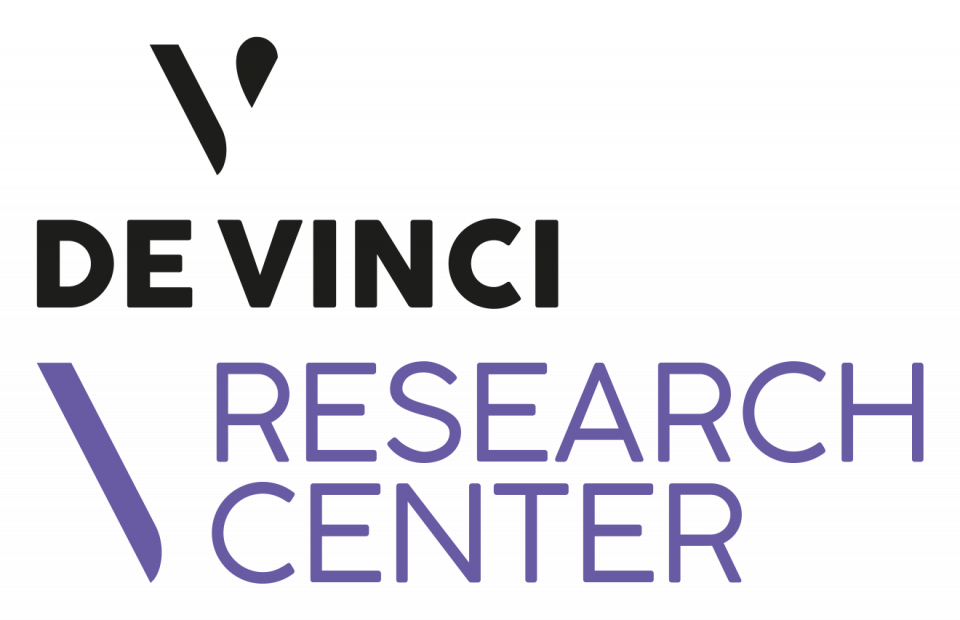De Vinci Research Center (DVRC) brings together all the researchers from the De Vinci Higher Education Group’s schools: the Business School (EMLV) and the Engineering School (ESILV). It is co-directed by Pascale Bueno Merino and Francesco Salvarani and aims to be recognized internationally in areas of expertise contributing to the strategic positioning of the De Vinci Higher Education Group in terms of innovation, digitalization, transversality and ecological transition.
DVRC Objectives

The objectives of the DVRC are :
– To develop quality research, recognised in the national and international academic communities;
– To develop research partnerships recognised by the economic and industrial community;
– Disseminate a research culture in all ESILV and EMLV courses;
– Encourage synergies between the specialisations of the schools and the expertise of the DVRC;
– Promote interdisciplinarity between engineering and management.
The activity of the DVRC is structured within three interdisciplinary research axes and a partnership research cell.
Interdisciplinary Research Axes
“New Materials, Intelligent Systems & Innovative Companies”
“Energy Efficiency & Socially Responsible Markets”
“Data Science, Digital Transformation, Risks & Complex Systems”
Interdisciplinarity and responsible research are closely linked. The integration of environmental or societal concerns into research involves mobilizing multiple skills and expertise to establish an interdisciplinary dialogue, conducive to the resolution of complex problems.
New Materials, Intelligent Systems & Innovative Companies
The areas of expertise within Research Axis “New Materials, Intelligent Systems, and Innovative Companies” encompasses a wide range of subjects, spanning from the research of emerging materials, intelligent systems, cybersecurity and networks, to the study of the micro-, meso-, macro- dynamics and the psychological, behavioural, and social implications brought by developing, using, and coping with these innovations. In this context, the Axis is structured along two dimensions: Intra-disciplinary areas and Inter-disciplinary projects. Intra-disciplinary areas aim to bring together a community of “thematically close” researchers, while inter-disciplinary projects aim to gather researchers interested in a specific scientific research topic, which is usually multi-disciplinary.
More
Energy Efficiency & Socially Responsible Markets
The Research Axis “Energy Efficiency & Socially Responsible Markets” brings together EMLV & ESILV researchers from different academic disciplines (accounting, chemical engineering, energy production/consumption forecasting, corporate, entrepreneurial and market finance, human resources management, management control, marketing and consumer behavior, multi agents modeling, organizational behavior, social lifecycle analysis, strategic management), and professional backgrounds.
More
Data Science, Digital Transformation, Risks & Complex Systems
Research Axis “Data Science, Digital Transformation, Risks & Complex Systems” represents a concerted collaboration between researchers from the ESILV and EMLV. Their combined expertise provides a comprehensive lens through which they tackle three primary areas of investigation: Complex Systems, Risks, and Data Science and Digital Transformation.
More
Scientific Council
The Scientific Council (SC) has the same functions as those of universities and other “grandes écoles”. It is consulted on research policy, scientific and technical documentation and the allocation of research funding. It issues recommendations on the broad outlines of these policies. Its members may also be asked by the President of the Scientific Council to carry out various expert studies relating to research at the Pôle Léonard de Vinci.
External Members
- Christophe Assens, University Professor, Versailles Saint-Quentin
- Pierre-Jean Benghozi, Dean of Research, CNRS et école Polytechnique
- Francisco Chinesta, Professor at l’ENSAM, Paris
- Jean-Michel Coron, University Professor, Pierre et Marie Curie
- Valérie Fernandez, University Professor, Telecom Paris
- Alessio Figalli, University Professor, École Polytechnique Fédérale de Zurich (ETH Zurich)
- Nicolas Gaussel, President and CEO of METORI Capital Management
- Jocelyn Martel, Professor, ESSEC
- Nil Özçaglar – Toulouse, University Professor, Université de Lille
- Serge Petiton, University Professor, Ecole Universitaire des Ingénieurs de Lille
- Martin Schweizer, University Professor, École Polytechnique Fédérale de Zurich (ETH Zurich)
- Peter Tankov, University Professor, ENSAE
- Hubert Tardieu, director of Gaia-X in charge of government relations
Internal Members
- Pascale Bueno Merino, Dean of Research EMLV
- Francesco Salvarani, Dean of Research ESILV
- Nicolas Travers, Deputy Director of Research ESILV
- Tahar Cherif, Research Partnership Unit
- Alessandro Biancalani, co leader ESILV research Axis « Complex systems, risks, Data science and digital transformation»
- Pascal Clain, co leader ESILV research Axis « Energy efficiency, socially responsible markets »
- Jingshu Du, co leader EMLV research Axis « New materials, intelligent systems and innovative companies »
- Insaf Khelladi, co leader EMLV research Axis « Energy efficiency, socially responsible markets »
- Thuy Nguyen, co leader ESILV research Axis « New materials, intelligent systems and innovative companies »
- Peter Saba, co leader EMLV research Axis « Complex systems, risks, Data science and digital transformation »
Guest Members :
- Pascal Brouaye, Président of Léonard De Vinci Association
- Duc Khuong Nguyen, Director of EMLV
- Pascal Pinot, Director of ESILV











